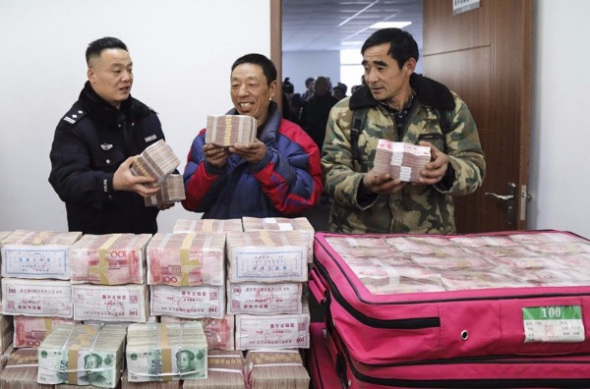
Migrant workers receive wages that police helped them recover from employers who defaulted on payments in Shenyang, Liaoning province, on Tuesday. (Cai Jingyu/For China Daily)
Employers who default on paying migrant workers' wages this year should be placed on a national blacklist, the head of the Ministry of Human Resources and Social Security said.
Yin Weimin, the minister, said that governments at all levels should "thoroughly check" on any wages that may be in arrears as Chinese New Year approaches, and set a deadline for companies and employers to clear up the situation.
"Those who disregard the deadline for paying wages for no reason should be severely punished and put on the blacklist," he said.
The checks should focus on sectors where migrant workers are frequently hired, such as the construction industry, labor-intensive manufacturing industries and restaurants, Yin said.
The ministry issued a regulation in September creating a national blacklist to punish employers that fail to pay migrant workers.
Those on the blacklist could face punishments from as many as 30 government departments-such as limited access to government financial support, purchases and bidding-and could be barred from favorable tax policies.
Yin added that local governments should assist companies and employers facing an overwhelming number of defaults to ensure migrant workers can spend a happy Lunar New Year after a year's hard work.
Yin also stressed the importance of creating a channel for migrant workers to appeal if their rights are violated, so that they don't resort to illegal means to retrieve their wages.
"Such cases should be given priority and be settled swiftly," Yin said.
According to the ministry, worker protection authorities at all levels settled 128,000 cases from January to November this year, and recovered 22.4 billion yuan ($3.39 billion) for 2.81 million workers. The number of cases has decreased 38 percent year-on-year.
"However, due to an imperfect market order in the construction industry, defaulting on payments persists. Some medium and small companies that are experiencing operational difficulties have also given rise to the issue," Yin said.


















































